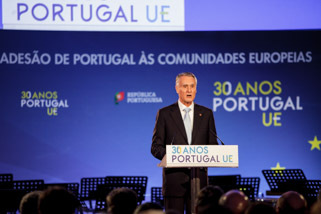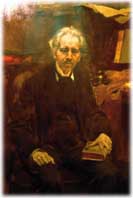
 Joaquim Teófilo Fernandes Braga
Joaquim Teófilo Fernandes Braga
Born on 24 February 1843 in Ponta Delgada, on the island of São Miguel in the Azores archipelago. Son of Joaquim Manuel Fernandes Braga, an army officer who supported D. Miguel and later taught mathematics and philosophy and of Maria José da Câmara Albuquerque, both of aristocratic descent. It is thought that his father descended from King João V and his mother possibly from King Afonso III. His mother died when he was only 3. Her death and his bad relationship with his stepmother, whom his father married two years later, marked his reserved and brusque temperament.
In 1868 he married Maria do Carmo Xavier and had three children. Both his wife and the children died very young. Teófilo Braga died in his office on 28 January 1924.
PROFESSIONAL ACTIVITY
To get away from his stepmother he began working at the printing press of the newspaper A Ilha, and then wrote for the newspapers O Meteoro and O Santelmo.
He completed his schooling in Ponta Delgada and went to Coimbra University with the idea of reading theology, but in the end chose law.
As his father’s financial contribution was scarce, he paid for his course with translations, coaching, articles and poems. He defended his thesis and became a doctor in 1868 at the request of his faculty. Their liking for him did not prevent him being passed over in the position of professor there, the same happening at Oporto Polytechnic School.
In 1872 he applied to be a professor in the chair of Modern Literature at the Arts Faculty and was awarded the position over Manuel Pinheiro Chagas and Luciano Cordeiro.
From then on the positivism of Auguste Comte had a decisive influence on his thinking and consequently on his literary work and his political attitude. After 1878 he founded and with Júlio de Matos directed the magazine O Positivismo, similarly with the magazines A Era Nova in 1880 and Revista de Estudos Livres, after 1884, this time with Teixeira Bastos.
In 1880 with Ramalho Ortigão he organised and coordinated the commemorations of Camões’s tercentenary.
POLITICAL CAREER
In 1871 he was one of the subscribers to the project of the Democratic Conferences at Casino Lisbonense which were stopped by the royalist authorities.
Influenced by the sociological and political theses of the positivist theory he soon became a republican and one could say that he belonged to the generation of doctrinaire republicans. The following were some of his activities in this field:
ELECTIONS AND PRESIDENTIAL PERIOD
Elected at the session of Congress of 29 May 1915 with 98 votes, as against 1 vote for Duarte Leite Pereira da Silva and 3 blank votes. Because of Manuel de Arriaga’s resignation he was a transition president until 5 October of that same year, when he was replaced by Bernardino Machado.
As João Chagas had suffered an assassination attempt and could not take office, José Ribeiro de Castro was sworn in as head of a new government, the 11th Constitutional Government, on 18 June 1915 which lasted until 29 November of that year.
POST-PRESIDENTIAL ACTIVITY
After the presidency, Teófilo Braga, a lone and solitary figure who had lost his nearest and dearest, dedicated himself almost exclusively to writing.
MAIN WORKS
Teófilo Braga’s literary output is vast and impossible to list exhaustively in a summarized document such as this one. One should mention a few examples to illustrate the many areas that he approached. Thus: Folhas Verdes, 1859, Stella Matutina, 1863, Visão dos Tempos e Tempestades Sonoras, 1864, A Ondina do Lago, 1866, Torrentes, 1869, Miragens Seculares, 1884, represent his incursions into poetry. He also wrote História da Poesia Popular Portuguesa, in 1867, covering the Romanceiro Geral e Cancioneiro Popular, and A Floresta de Vários Romances, 1868.
As a researcher into the origins of peoples, he followed the line of analysis of traditional elements from the myth to custom, ending with the tales of oral tradition, which enabled him to write works such as Os Contos Tradicionais do Povo Português, 1883, O Povo Português nos seus Costumes, Crenças e Tradições, 1885, and História da Poesia Portuguesa, which took him years to write as he sought the sources in various ages and schools.
The other areas of his 360 works cover such diverse fields as Universal History, History of Law, of Coimbra University, of Portuguese Theatre, of the influence of Gil Vicente on theatre, a History of Portuguese Literature, of Portuguese chivalry romances, of Romanticism in Portugal, of Republican Ideas in Portugal, not forgetting his literary and political polemic pamphlets and biographical essays such as the one on Filinto Elísio.
In addition to this literary torrent, not always rigorously handled, which led to him being criticised in literary circles, one cannot forget his contribution to the coordination of the works of Camões, Bocage, João de Deus and Garrett, prefaces to works by many representative writers and an endless array of articles written for contemporary newspapers.
© 2006-2016 Presidency of the Portuguese Republic
You have gained access to the records of the Official Site of the Presidency of the Republic from 9 March 2006 to 9 March 2016.
The contents available here were entered in the site during the 10 year period covering the two mandates of President of the Republic Aníbal Cavaco Silva.